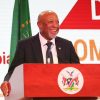Omanyano ovanhu koikundaneki yomalungula kashili paveta, Commisiner Sakaria takunghilile
Veronika Haulenga
Omanyano ovanhu koikundaneki yomalungula kashili paveta, Commisiner Sakaria takunghilile
Veronika Haulenga
Listeners:
Top listeners:
-
play_arrow
Omanyano ovanhu koikundaneki yomalungula kashili paveta, Commisiner Sakaria takunghilile Veronika Haulenga
The 8th Pan African Forum on Migration (PAFoM-8): Bolstering Free Movement – Free Trade Nexus in African Continental Free Trade Area (AfCFTA)

The 8th Pan African Forum on Migration (PAFoM-8) themed “Bolstering Free Movement and Trade Nexus in AfCFTA: Optimizing Benefits of Migration, Human Mobility and Development”, was held in Gaborone, Botswana recently.
The Forum was hosted by the African Union in collaboration with the Government of Botswana, the International Organization for Migration (IOM), Deutsche Gesellschaft für Internationale Zusammenarbeit (GIZ), which implements its activities on behalf of the German Federal Ministry of Economic Development (BMZ) as well as the African Newspage.
The FMP, the updated Migration Policy Framework for Africa (MPFA) and its Plan of Action (2018–2030) are the cornerstones of the AU’s migration policy. While the FMP supports the free movement of people, as well as their rights to residence and establishment across the continent, the MPFA provides AU member states and Regional Economic Communities (RECs) with detailed policy guidelines to aid the creation and implementation of national and regional migration policies.
In her keynote (https://apo-opa.co/49RzqBg) at the opening of PAFOM-8, Hon Anna Maria Mokgethi, Botswana’s Minister of Labor and Home Affairs, called on African leaders to invest in creating awareness of the vast opportunities which can be brought by safe and orderly migration, in terms of unleashing sustainable economic growth.
“We, however, cannot talk about sustainable development without talking about migration and trade. In simple terms, migration influences economic development through facilitation of trade, to the extent that without people, goods and services would not be able to cross borders and contribute to formal economic growth. Free movement of goods and people (including labor) and capital is a powerful facilitator for sustainable development,” the Minister noted.
In his remarks, Mr Maemo Machete, Director of the AU’s Khartoum Center focused on improving migration governance, said was only by implementing the provisions of the FMP and MPFA that the goals of the AfCFTA will be seamlessly realized, noting that such a move would allow all economies across the continent to significantly benefit from the resultant improved intra-African trade, through seamless mobility of goods, services, ideas and cultures across the continent.
“The movement of people across borders in Africa is not only a fundamental human right but can be a powerful tool for advancing the connectivity of economies. It also has the potential to boost household incomes, reduce household poverty, inequality and stimulate economic growth. It is [also] imperative to promote mutual recognition of skills and qualifications across the continent. By doing so, we can create a conducive environment for labor migration, for the benefit of the continent,” Mr Machete said.
In her remarks, Ms Margit Hellwig-Bötte, German Ambassador to Botswana, commended the AU for relentlessly promoting the vision of an integrated continent through its promotion of the ratification and implementation of the AfCFTA and the FMP, underlining the Government of Germany’s commitment to accompany the AU Commission and other AU organs in their advisory, capacity building and resource mobilization efforts towards the ratification and implementation of the AU-FMP.
“Our government – through its implementing organization GIZ – has contributed to strengthening the technical and operational capacities of labor institutions, social partners, and civil society to improve the governance and administration of labor migration. The support for the development of the guidelines on labor migration related provisions of the Free Movement Protocol is a clear sign of the importance attributed to the linkages between free movement and labor migration,” noted the German envoy.
While handing over the chairmanship of PAFoM to Botswana, Ms Lynder Nkuranga, Director General of Rwanda Directorate General of Immigration and Emigration (DGIE) cum PAFOM 7 chair, said Rwanda has embraced the principle of free movement as all African citizens no longer require a visa to visit the country.
“Rwanda has embraced the free movement of people and no visa is required of all African citizens. No visa is required for Commonwealth citizens and no visa is required for citizens of Francophone countries. I can testify that the visa-free regime is working, we have benefitted and there are no threats resulting from implementation of our free movement policy, as being perceived by some Member States,” Ms Nkuranga assured fellow AU Member States.
In a communique (https://apo-opa.co/3R0KBz4) issued at the end of PAFoM-8, held from 31st October to 2nd November 2023, senior officials responsible for immigration and migration, international cooperation, trade and investment, labor and employment from AU Member States as well as parliamentarians from continental and regional institutions, committed to supporting the implementation of the clarion call and action points of PAFoM-8.
Among others, the PAFoM-8 communique called on Member States to improve the migration regulatory environment so as to facilitate free movement in its full scope, particularly the right of entry, right of residence, and right of establishment, as well as the need to align trade and migration strategies with the AfCFTA and reduce barriers of doing business on the continent to attract investors.
The communique called on the MS to leverage programs like JLMP to expand regular pathways for migrant workers to reduce trafficking in persons and migrant smuggling and called on the AU Commission to jointly with Member States strengthen border governance using the databases of Interpol’s National Central Bureaus (NCBs) and through effective border management systems to ensure safe, orderly, and dignified movement in accordance with the Global Compact for Migration (GCM).
Distributed by APO Group on behalf of African Newspage.
Similar posts
Windhoek Weather
Most popular

Mbumba signs off new benefits for retired political office bearers

Former FNB employee arrested after defraud pensioner off N$215, 000

Namdia Heist: More questions, lots of confusion

Omuhwahwameki Michael okuunganeka oshikonga shoku patitha oostola dho Rani moshilongo ashihe.

Walvis Bay woman loses over N$777.000 to a fraudster
Copyright 2025 Future Media (Pty) Ltd | Website by Digital Platforms
Tel: +264 83 000 1000 | Email: news@futuremedia.com.na



